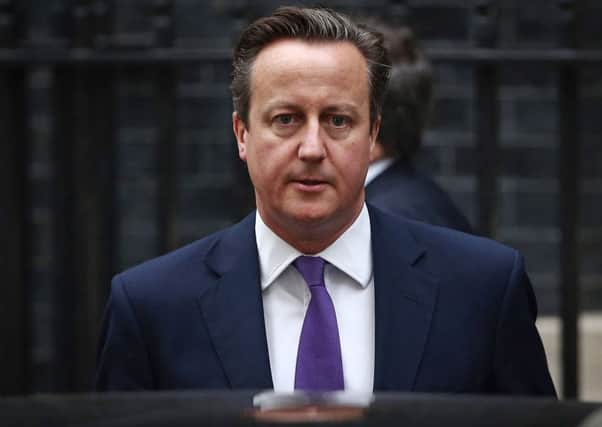Cameron warns Putin over new sanctions


The Prime Minister is expected to meet Mr Putin tomorrow on the fringes of the G20 summit in Australia, which is officially focusing on economic growth and jobs but is rapidly developing into a showdown between the Russian president and other leading world powers.
Mr Putin has stoked up tensions at the Brisbane gathering by deploying a task force of warships to the Coral Sea off the coast of Queensland, in what Australian PM Tony Abbott described as part of a “regrettable pattern” of Russian military assertiveness which appeared to be trying to recreate the “lost glories” of the Soviet Union.
Advertisement
Hide AdAdvertisement
Hide AdMr Abbott, who is hosting the gathering of the world’s 20 leading economies, has called for an apology from Russia for the downing of the Malaysia Airlines jet MH17 over Ukraine, which killed 38 Australians in July.
And Mr Cameron has made clear he will confront Mr Putin over Russia’s failure to live up to the terms of a peace deal signed by Ukraine, Russia and pro-Moscow separatists in Minsk in September.
Following former Soviet president Mikhail Gorbachev’s warning that Mr Putin was pushing the world towards a new Cold War, Mr Cameron said that the international community would not simply “move on” from events in Ukraine, and held out the prospect of further EU sanctions if Russia continues to take the wrong path.
Speaking to reporters in Brisbane, Mr Cameron said: “I hope it’s possible to stand by the Minsk agreement. It’s not a perfect agreement from anyone’s point of view, but it has some key parts to it, about Russian troops and about borders and about respecting Ukraine’s sovereignty.”
Advertisement
Hide AdAdvertisement
Hide AdHe added: “I think there’s a very clear choice for Russia of which path it takes.
“If it takes the Minsk path we could progressively see normalisation of relations between Russia and Ukraine, you could see Ukraine’s sovereignty and elections respected, you could see the removal of sanctions if that were to happen.
“But the other path of not respecting the Minsk agreement, continuing to undermine Ukrainian sovereignty, continuing to see Russian troops in Ukraine and Russian tanks and the rest of it - I don’t think Europe would have a choice but to maintain the sanctions we have, to start looking at further measures that could be taken if Russia takes further steps and to putting relationships between European countries and Russia on a very different basis.
“That’s not something I want to see happen, but I think Russia needs to know that this can’t be like what happened in the past with other frozen conflicts, where the world has moved on. I don’t think the world can move on from what’s happened in Ukraine.”
Advertisement
Hide AdAdvertisement
Hide AdMr Cameron said that EU sanctions against key members of Mr Putin’s inner circle as well as sectors of the Russian economy have had an effect on the value of the rouble, the Moscow stock market and the ability of Russian banks to access international finance.
“Russian action in Ukraine is unacceptable,” he said. “We have to be clear about what we are dealing with. It is a large state bullying a smaller state in Europe.”
In an apparent reference to the build-up to the Second World War, the PM added: “We have seen the consequences of that in the past and we should learn the lessons of history and make sure we don’t let it happen again.”
The sanctions regime is on the agenda for a meeting of EU foreign ministers in Brussels on Monday, though at present any expansion of the action is thought likely to be restricted to members of pro-Russian rebel groups in eastern Ukraine.
Advertisement
Hide AdAdvertisement
Hide AdMr Putin’s invitation to Brisbane has sparked protests by Ukrainian groups - as well as a counter-demonstration by members of Australia’s Russian expat community.
And the Australian press has reacted with fury to the deployment of the Russian cruiser Varyag and three support vessels, with one popular newspaper splashing Putin’s face in front of a Cold War-era Soviet hammer and sickle on its front page.
Speaking alongside Mr Cameron at a pre-summit press conference in Canberra, Mr Abbott said that, while investigations continue into the MH17 disaster, “it is our clear understanding on the evidence so far that clearly this was shot down by Russian-backed rebels, most likely using Russian-supplied equipment, so I think there is a heavy responsibility on Russia to come clean and atone”.
The Australian PM, who spoke to Mr Putin at this week’s Asia-Pacific APEC summit in Beijing, said: “One of the points that I tried to make to president Putin is that Russia would be so much more attractive if it was aspiring to be a superpower for peace and prosperity, if it was trying to be a superpower for ideas and for values instead of trying to recreate the lost glories of tsarism or the old Soviet Union.”
Advertisement
Hide AdAdvertisement
Hide AdHe added: “It is part of a regrettable pattern. Whether it’s the bullying of Ukraine, whether it’s the increasing Russian military aircraft flying into the air space of Japan and European countries, whether it’s the naval task group which is now in the South Pacific, Russia is being much more assertive than it has been for a very long time.
“Interestingly, Russia’s economy is declining even as Russia’s assertiveness is increasing.”